#social credit
Text

Control the money, you control the people. Now is the time to prepare for a seismic shift in our economic lives. Russia and Japan are already on board and It's only a matter of time until western governments start piloting CBDCs.
3 Ways To Prepare: https://www.jasonbassler.com/product-page/CBDCbook
CBDC #CentralBanks #DigitalCurrency
#the free thought project#tftp#cbdc#central banks#digital currency#wef#digital id#agenda 2030#social credit
17 notes
·
View notes
Text
Elon Musk's father was a progressive in local government in South Africa during the apartheid era. Elon is estranged from his father and left South Africa when black majority rule appeared on the horizon.
Elon seems to take after his mother's side of the family.
This month, Elon Musk threatened to sue the Anti-Defamation League, alleging that its denunciation of X—the A.D.L. had accused the social-media platform formerly known as Twitter of amplifying antisemitism—has cost Musk’s company a fortune in advertising revenue. The Anti-Defamation League, in turn, asserted that Musk’s threat was “dangerous and deeply irresponsible.”
[ ... ]
Musk’s family history has a bearing on the dispute, but, in the book, as I pointed out in a review, Isaacson only glancingly discusses Musk’s grandfather J. N. Haldeman, whom he presents as a risk-taking adventurer and whose politics he dismisses as “quirky.” In fact, Haldeman was a pro-apartheid, antisemitic conspiracy theorist who blamed much of what bothered him about the world on Jewish financiers.
Elon Musk is not responsible for the political opinions of his grandfather, who died when Musk was three years old. But Haldeman’s legacy casts light on what social media does: the reason that most people don’t know about Musk’s grandfather’s political writings is that in his lifetime social media did not exist, and the writings of people like him were not, therefore, amplified by it. Indeed, they were very unlikely to circulate widely, and are now quite rare. Still, they’re not hard to find, which makes it unfortunate that Isaacson neither quotes from nor mentions them.
Musk has said that he bought Twitter to halt the advance of a “woke mind virus” spreading online. His grandfather wrote his tracts to raise an alarm about what he called “mind control,” on the radio and television, where “an unconditional propaganda warfare is carried on against the White man.”
Haldeman was born in Minnesota in 1902 but grew up mostly in Saskatchewan, Canada. A daredevil aviator and sometime cowboy, he also trained and worked as a chiropractor. In the nineteen-thirties, he joined the quasi-fascistic Technocracy movement, whose proponents believed that scientists and engineers, rather than the people, should rule. He became a leader of the movement in Canada, and, when it was briefly outlawed, he was jailed, after which he became the national chairman of what was then a notoriously antisemitic party called Social Credit. In the nineteen-forties, he ran for office under its banner, and lost. In 1950, two years after South Africa instituted apartheid, he moved his family to Pretoria, where he became an impassioned defender of the regime.
As historian Jill Lapore (author of that New Yorker article) mentioned, Elon Musk is not responsible for J. N. Haldeman's opinions. But it's curious that both Elon and J.N. have been fishing in similar waters.
Social Credit has roots that aligned it to fascism. Though after World War II the Canadian Social Credit Party's message became more diluted and it drifted towards libertarianism; it had seats in Canada's parliament as late as 1980.
Like the bulk of Silicon Valley entrepreneurs, Musk embraced libertarianism – gladly using the copious infrastructure and research paid for by government funds while claiming to have created wealth without getting help from anybody else.
We don't inherit political views or ideologies the same way as DNA. But pervading mindsets in a family can persist with some members of that family for several generations.
Twitter/X is increasingly a cesspool of hate speech. J. N. Haldeman probably would have approved.
#elon musk#twitter#x#social media#j.n. haldeman#technocracy#fascism#social credit#libertarianism#antisemitism#adl#hate speech#leave twitter#delete twitter#quit twitter
7 notes
·
View notes
Text

"37 Juveniles Sent to C.A.Α.," Montreal Star. May 7, 1943. Page 4.
---
Army Gives Data On 'Teen-Age Soldiers
---
OTTAWA, May 7-(C.P.) - A total of 37 soldiers under 19 years of age were sent overseas from Alberta during 1942, John Blackmore, New Democracy leader, was informed in a reply to a question tabled in the House of Commons.
Of these 23 had less than six months training, and 11 of the 23 had less than five months while seven of the 23 had less than four months. The seven were in technical arms and their training was to be completed overseas.
Mr. Blackmore's question asked if any "teen-age" boys had been sent overseas. The reply said there was no regulation against sending men over 19 overseas and it was assumed the question referred to those under that age. The reply said a routine order prohibited sending men under 19 overseas and a further order had to be issued in July, 1942, to emphasize the necessity for rigid adherence to the earlier order.
Of the 37 soldiers referred to, 29 had gone overseas before the further order was issued and all but one of the remainder had left before the end of August, 1942. Five soldiers under 18 made false age declarations on enlistment.
To the same question the Air Force and Navy replied that it was impossible to obtain the information from their records without a large amount of work and expense which would interfere with other essential work.
#house of commons#member of parliament#new democracy party#child soldiers#history of canadian youth#teenagers#canadian active service force#military recruitment#military enlistment#manpower shortage#canada during world war 2#social credit#alberta history
3 notes
·
View notes
Text
Case Study on China
The Great Firewall of China
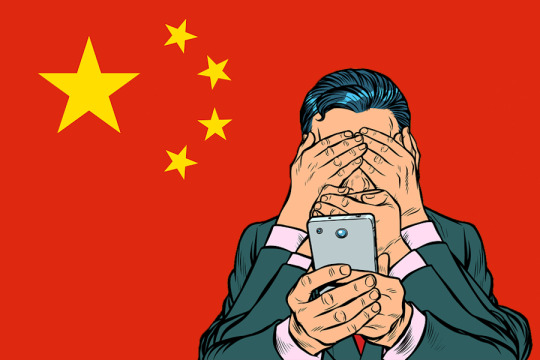
The Chinese government has voiced worries about the internet since 1998, viewing it as a potential source of social and political challenges to the regime's cultural values and ideology (Cawford, 2023). In response, China's Ministry of Public Security (MPS) directed the Golden Shield project, which was started in 1998 and finished in 2006 (Open Society Institute, n.d.). This initiative is a regulatory framework accompanied by an extensive system of internet censorship. According to Kerner, the western media has called it "The Great Firewall of China”, implying that it encompasses a set of tools, services, and regulations that the government of the People’s Republic of China uses to prevent access to specific online information by individuals who are physically inside its boundaries.
If you've read this far, you might be wondering how the Great Firewall of China blocks content.

The Great Firewall of China uses various methods to block content. It inspects internet traffic entering and leaving China, blocking entire domains and IP address ranges. Additionally, when a user attempts to search for the blocked keywords and phrases, the Great Firewall will block and redirect the website query in a way that does not let the user access the requested information. Additionally, the firewall also actively scans network connections for potential proxy IPs used to bypass it, such as VPNs or Tor privacy networks (Kerner, n.d.).
Criticism and Concerns of the Great Firewall of China
The Chinese government has come under criticism from numerous human rights organisations for the extensive and invasive state monitoring methods used by the Great Firewall. Critics argued that China has restricted its citizens' freedom of access to information sources by enforcing the Great Firewall's strict censorship (Gisonna, 2023). To illustrate, Google holds less than a 2% market share in China, primarily due to government restrictions, with Baidu being the dominant search engine service (Seth, 2022). In March 2009, the Chinese government also banned access to YouTube after the dissemination of videos regarding security personnel beating protestors in Tibet, a region of China (Zed Biz, 2023).
According to Gisonna (2023), in spite of the Great Firewall facing criticism, numerous technology firms have yielded to the Chinese government's self-censorship guidelines, adapting their products to align with Chinese regulations. For example, Microsoft Corporation has produced an altered version of its web search engine, Bing.
China’s powerful app - WeChat
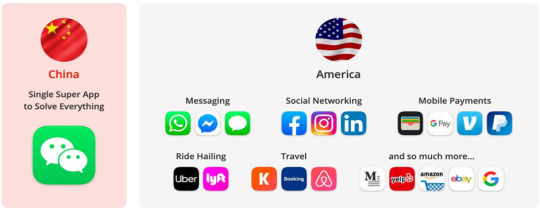
WeChat was developed by Chinese technology giant Tencent Group and was first introduced in 2011 (Sapra, 2019).
As per Zhang (2018), WeChat has evolved beyond its original purpose as a messaging and social networking app. Tencent has effectively transformed WeChat into a super app, serving as a comprehensive platform where users can seamlessly access a multitude of authorized third-party services. These services range from tasks like ride-hailing, purchasing movie tickets, ordering food delivery, booking hotels, paying bills, and many other functionalities. Long story short, it is nearly impossible to do anything without access to WeChat nowadays (Sapra, 2019).
Tencent (2018) argued that “WeChat aims to embed itself in every moment of the user's daily life, from morning till night, anytime, anywhere.”
Why WeChat fails when expanding abroad?
The majority of features of WeChat were constrained due to the absence of collaboration with local suppliers to offer those services. This is why WeChat is losing its competitive edge and transforming into merely another messaging application (Seppam, 2023).
Simultaneously, as per Medium (2019), WeChat's failure can be attributed to its delayed entry into the foreign market. By the time WeChat ventured into the international market in April 2012, WhatsApp had already surpassed its innovation period, spanning from 2009 to 2011. This indicates that WeChat faced limited growth opportunities to capture the global market.
Social Credit System in China
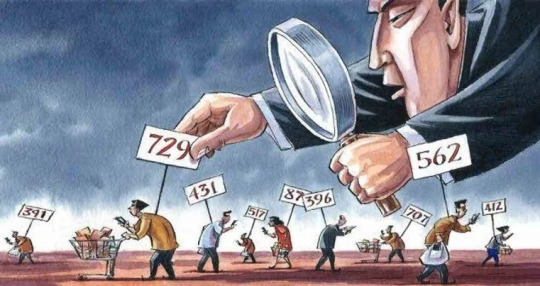
China's social credit system comprises databases and initiatives designed to monitor and evaluate the reliability of individuals, businesses, government entities, and the judiciary (Lee, 2020). It was formally introduced to the public in 2014 with the unveiling of the Outline for the Construction and Planning of the Social Credit System. In addition to looking at financial history and activity, that similar to credit rating systems in other nations, it also considers things like unethical behaviour and legal infractions (Koty & Huld, 2023).
A credit score may benefit from making good contributions to society through the establishment of social programmes, donations to charitable organisations, or other corporate social responsibility (CSR) initiatives. A high credit score may grant access to discounted public housing or priority medical care. Conversely, engaging in such undesirable behaviour as dishonest or unlawful taxation, misleading customer behaviour, and so forth, may result in a low rating and adverse outcomes including being barred from trains and aeroplanes (Lee, 2020).
Is the social credit system a way to instill good behaviour and provide safety to citizens?

From my point of view, the opinions on this question are diverse. Supporters argue that the Social Credit System could potentially improve overall societal conduct by promoting trust and integrity. They suggest that by rewarding responsible behaviour and penalising misconduct, the system could contribute to a safer and more orderly society.
On the other hand, critics express concerns about privacy violations, the potential for abuse of power, and the impact on individual freedoms. The system involves extensive surveillance and data collection, raising worries about government intervening into citizens' lives. There are fears that the system could be used for social and political control, suppressing dissent, and restricting individual freedoms.
In general, the goal of China's social credit system is to ensure that residents and companies doing business there adhere to local laws and regulations (Velocity Global, 2023). It is important to strive for a balance between the potential benefits of improved societal behaviour and the protection of individual rights.
References:
Crawford, D. (2023, February 3). What is the Great Firewall of China and how does it work. Proton VPN Blog. https://protonvpn.com/blog/great-firewall-china/
Gisonna, N. (2023, September 21). Great Firewall. Encyclopedia Britannica. https://www.britannica.com/topic/Great-Firewall
Kerner, S. M. (n.d.). Great firewall of China. WhatIs.com. https://www.techtarget.com/whatis/definition/Great-Firewall-of-China
Koty, A. C. & Huld, A. (2023, March 24). China’s social credit system: What businesses need to know. China Briefing News. https://www.china-briefing.com/news/chinas-social-credit-system-how-it-works/
Lee, A. (2020, August 9). What is China’s social credit system and why is it controversial? South China Morning Post. https://www.scmp.com/economy/china-economy/article/3096090/what-chinas-social-credit-system-and-why-it-controversial
Medium. (2019, November 19). Identify and explore why “WeChat” failed internationally. https://medium.com/@uncigolini/identify-and-explore-why-wechat-failed-internationally-605cff5043d9
Sapra, B. (2019, December 21). This Chinese super-app is Apple’s biggest threat in China and could be a blueprint for Facebook’s future. Here’s what it’s like to use WeChat, which helps a billion users order food and hail rides. Business Insider. https://www.businessinsider.com/chinese-superapp-wechat-best-feature-walkthrough-2019-12
Seppam, M. (2023, April 5). How China’s Super-App WeChat Failed in USA and Europe. Why do other successful local apps fail when expanding abroad? https://www.linkedin.com/pulse/how-chinas-super-app-wechat-failed-usa-europe-why-do-other-seppam/
Seth, S. (2022, December 31). Baidu vs. Google: What's the Difference. Investopedia. https://www.investopedia.com/articles/investing/051215/baidu-vs-google-how-are-they-different.asp#:~:text=Google%20has%20a%20strong%2C%20dominant,government%20has%20restricted%20its%20use.
Velocity Global. (2023, October 6). The Chinese Social Credit System: What to know as a business owner. https://velocityglobal.com/resources/blog/chinese-social-credit-system/
Zhang, M. (2018, March 26). China’s WeChat: The Power of the Super App. Medium. https://medium.com/@miaozhenzhang666/chinas-wechat-the-power-of-the-super-app-dc144657625e
5 notes
·
View notes
Text
Is the Social Credit System a way to instill good behavior and provide safety to citizens? At what cost?
The introduction of the Social Credit System represents a significant change in management, with the objective of shaping societal behavior and ensuring citizen safety through an elaborate system of observation and evaluation. Designed with the aim of promoting good conduct and reducing possible hazards, this system generates important concerns regarding its efficiency in accomplishing these goals. The Social Credit System (SCS) of China has garnered significant scientific and public interest due to its comprehensive attempt to incorporate traditional commercial credit ratings with social behavior (Meissner, cited in liang 2018). The Chinese government seeks to examine the "creditworthiness" and "trustworthiness" of individuals and organizations by assigning them a computational score based on their past and current social and economic activities. These credit scores will determine whether the participant is eligible for incentives or penalties (Liang 2018). Does the social credit system provide an effective method for promoting good conduct and maintaining security while protecting privacy and freedom of its citizens, and does it achieve this without incurring any costs?

The Social Credit System (SCS) has numerous potential advantages. Through the introduction of incentive for beneficial activities and the promotion of a collective feeling of responsibility, the system has the ability to improve social behavior. According to Gaedke (2021), advantages involve reduced electricity expenses, availability to prestigious universities and advanced education, easier access to public housing, complimentary gym membership, and an increased chance of getting a loan. Participating in a certain amount of positive acts inside the Social Credit System framework not only provides incentives but also serves as a compelling motivation for individuals to make excellent contributions to their community. Moreover, its function in detecting possible dangers and decreasing criminal behavior through increased monitoring shows potential for improving public safety. According to Alguliyev (2021), The Chinese government claims that, despite the challenges, the SCS has a significant role in minimizing risks in the economic domain and may serve as a crucial tool in guaranteeing and preserving public safety.Citizens in all nations desire a society that is both stable and secure. The SCS promotes the establishment of a model legal system in the country, with extensive oversight over the actions of citizens, government entities, and various corporations. But it's important to look at these possible benefits in the context of the bigger issues and effects that come with having such a thorough system for keeping an eye on society.

With the benefits the SCS brings, there are significant risks and costs linked to the implementation of the Social Credit System. Amidst the potential advantages, there are significant risks and costs linked to the implementation of the Social Credit System. One notable primary concern is the invasion of privacy due to the system's heavy surveillance and data gathering, which raises concerns about protecting individuals' personal information and privacy .According to Alguliyev (2021), one of the law problems with the SCS is that it neglects individuals' privacy and submitting their socio-economic status to information systems goes against political guidelines and the concepts of "personal data security". Additionally, constantly keeping an eye on people's daily lives could mean that their private lives are invaded, which could affect their freedom. There are multiple instances where the Social Credit System tries to introduce a new policy with positive intentions, but local governments implement the policy in various twisted ways to serve their own goals (Liang 2018). As a result, social credit programs have the potential to limit individual rights, such as freedom of speech. These problems highlight the requirement for a detailed examination of the balance between the advantages of the system and the protection of basic individual rights.

The implementation of the Social Credit System provokes a wide variety of reactions from the public, ranging from acceptance to open hatred. The influence of public perception plays a crucial role in defining the discussion surrounding this surveillance mechanism. However, Chinese individuals may face challenges when expressing disagreement towards specific policies, numerous instances exist where both the central and local government have reconsidered or overturned decisions in response to widespread public protests (Creemers 2018). The criticism towards the SCS serves as a means for expressing concerns, resulting in a dynamic engagement between the government's objectives and the rights and aspirations of the people. According to Gaedke (2021), critics of the system, especially those in western media, have compared it to a dystopian feature of a science fiction film.
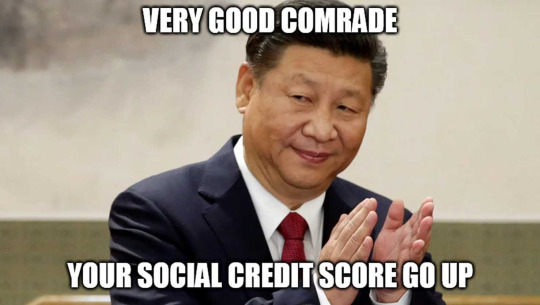
In conclusion, the Social Credit System includes a complicated web of possible advantages and significant disadvantages, raising crucial inquiries regarding the complex balance between community wellbeing and personal rights. Studies have demonstrated that although social credit settlement is intended to safeguard a nation's economic welfare and security, it can compromise citizens' rights, impact their livelihoods, and give rise to data security concerns( Alguliyev 2021). The Social Credit System requires a reconsideration of trust, limitations on personal freedom, and the moral values that should guide our pursuit of an unbiased and equal social framework.
References:
Liang, F., Das, V., Kostyuk, N. and Hussain, M.M 2018, ‘Constructing a data‐driven society: China's social credit system as a state surveillance infrastructure’, Policy & Internet, vol .10 no.4, pp415-453, viewed 23 November 2023, <https://doi.org/10.1002/poi3.183>.
Gaedke, M 2021, ‘Social Credit System Pros and Cons – A Look at China’s System | Daily Infographic. [online] Daily Infographic | Learn Something New Every Day. Available at: <https://dailyinfographic.com/social-credit-system-pros-and-cons-a-look-at-chinas-system>.
Alguliyev, R.M. and Alakbarova, I.Y 2021, ‘Social credit system as a new tool in the management of citizens' behavior: problems and prospects’, International Journal of Education and Management Engineering (IJEME), vol. 11 no. 5, p.1, viewed 23 November 2023, <https://doi.org/ 10.5815/ijeme.2021.05.01>.
Creemers, R 2018, ‘China's Social Credit System: an evolving practice of control’, viewed 23 November 2023, <http://dx.doi.org/10.2139/ssrn.3175792>.
2 notes
·
View notes
Text

The technocracy is coming.
Will you bow to it, or give up everything for what you truly believe in?
1 note
·
View note
Link
The Alliance Defending Freedom (ADF) has quantified for the first time something that has long been apparent: too many American companies restrict their employees’ freedoms of speech and religion.
The 2022 Viewpoint Diversity Score Business Index, jointly conducted by ADF and Inspire Insight, a Christian financial analytics firm, ranked 50 of the largest U.S. companies according to whether their policies and actions supported or undermined Americans’ First Amendment rights. Out of a possible 100 points, these companies averaged what the authors described as an “abysmal” 12.
“We have to be concerned that consolidated power in the private sector is becoming a greater threat to free speech and religious freedom than government power,” said ADF Senior Counsel Jeremy Tedesco. “There’s a real risk that the social-credit-score approach will largely come to the United States through private corporations.”
…
In the U.S., by contrast, constitutional guarantees of personal liberties and privacy have prevented America’s government from emulating China’s, despite recent attempts to monitor Americans’ bank accounts and track their cell phones. While Congress and the courts have thwarted some of the Biden administration’s attempts to impose coercive mandates, private companies increasingly provide the leverage for progressives to “force behaviors,” as BlackRock CEO Larry Fink put it.
Financial institutions scored an average 11 out of 100 in the survey, which is particularly concerning, Tedesco said, “because banks and financial services have the ability to deny you access to your bank account, to loans, they have an incredible amount of power.” This power was demonstrated in Canada, when banks froze the personal accounts of truckers protesting Covid lockdowns last February.
A recent report by the Heritage Foundation cites instances like JPMorgan Chase and Wells Fargo closing personal bank accounts of targeted conservatives, and PayPal closing the accounts of people who were flagged by the Southern Policy Law Center. WePay, a subsidiary of JPMorgan, canceled payment services to a conservative fundraising event in November, prompting Missouri State Treasurer Scott Fitzpatrick to inform the bank that his state “would not do business with them so long as they continued to discriminate against customers based on their mainstream political positions.”
“The reality is that there are lots of policies inside these banks that are pathways to censorship,” Tedesco said. “We want to highlight the fact that those policies exist, encourage the banks to remove those policies, and encourage them to adopt policies that affirmatively commit that they are going to provide viewpoint-neutral services.”
The companies rated in the Viewpoint Diversity Index were scored on three categories, namely, their treatment of customers and vendors, their treatment of employees, and the types of charitable or political causes to which they donate. For 2022, the index’s inaugural year, the survey focused on companies the authors considered to have the greatest potential to affect free speech and religious freedom: financial institutions, computer and software makers, internet services, retailing, and outsourcing services.
…
It’s not clear whether left-wing corporate activism will continue to spread, or whether CEOs will begin to grow wary of dragging their companies into political controversies. Activist asset managers like BlackRock continue to vote the shares they manage to arm-twist corporate executives into pursuing progressive policies. This week, activist financial managers are attempting to force Walmart, Lowe’s, and TJ Maxx to take a stand against abortion restrictions.
…
Another recent survey, focusing exclusively on religious freedom, found that, although still a minority, 40 percent of the Fortune 500 companies are beginning to recognize religious diversity as part of their DEI criteria. And Tedesco said that, despite the dismal rankings on the Viewpoint Diversity Index, there are reasons to be hopeful.
“We actually did see some great practices and policies that already displayed the kind of respect for religious and viewpoint diversity that we would expect to see across the board,” he said. “We have laid a roadmap for corporations to follow with model policies, recommended practices, and other things. If they just adopt these policies and abide by them, it can make a real difference overnight.”
2 notes
·
View notes
Link
Banks Warn Collapse of Dollar System Is Near As Elite Prepare To Roll Out CBDCs
#cbdc#dollarsystem#programmablemoney#digitalid#digital identity#socialcreditscore#social credit#carbontaxscam#taxationtodeath#taxation is theft#taxationistheft#tyranicalgovernment#youwillownnothingandbehappy#wef#un#globalistelite#agenda 2030
1 note
·
View note
Text
China's surveillance state is moving into the west. And its not all facial recognition.
#china#surveillance#spying#censorship#social credit#big tech#camera#cyber security#technology#wef#united nations
1 note
·
View note
Link
Son of Vichy
#Canada#fascism#totalitarianism#social credit#censorship#criminalization#jackboot#politics#social control#exclusion#wage slavery
0 notes
Text






hey! for todays protest, i made this little zine about palestine (holding just simple and basic information).
you can download the zine here, fold it yourself, and distribute it around.
no credit is needed. feel free to leave it around bars, protests, or wherever. simply print it (borderless) and fold it. here is a tutorial on how to do it.
dont stay silent. there is a genocide of horrendous, atrocious proportions going on. also if you are a zionist here to argue with me, i dont plan to entertain you at all, not on my art blog. fuck off, you'll be swiftly blocked. i see enough of you clowns on my main and i have no energy for you. you can skip the death threats too bc i dont give a shit.
(i'm off to get ready for a surgery now, i just wanted to post it before this. if you need anything, i might take a bit to reply)
#free palestine#from the river to the sea palestine will be free#anti zionisim#israel is a terrorist state#israel is an apartheid state#palestine resources#gaza#palestine#art#comics art#art zine#p.s. i usually put my socials on the end of my zines#i didnt do it here not bc i dont stand behind my words#but bc im not interested in self-promotion over palestinian dead bodies!#srsly you dont have to credit me i just hope this zine gets distributed#and as always do *not* sell this.#its a free resource based in what ive learnt from palestinians themselves#its not made for monetary or followers gain
17K notes
·
View notes
Text
1 note
·
View note
Text
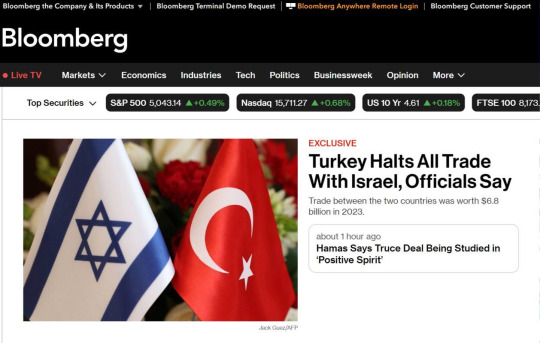
GREAT NEWS
turkey halted trade with israel.
for context: trade between the two was worth 6.8 Billion dollars in 2023
KEEP SPEAKING, KEEP PROTESTING. push for your government to also cut ties with israel. this is what we need
#credit to @miskinh4na for notifying me#israel#colombia university#turkey#jerusalem#free gaza#gaza#free palestine#palestine news#iran#united nations#palestine#gaza strip#social justice#yemen#colonialism#tel aviv#current events#news on gaza#news update#war news#war on gaza#west bank#apartheid#end the occupation#end the apartheid#free west bank#israel is an apartheid state#israel is a terrorist state
9K notes
·
View notes
Text
Hat das Social Credit Systems Auswirkungen auf die Gesundheit?
von Sabrina Haas
Einführung
Das Konzept des neu aufgekommenen "Social Credit Systems" (SCS) bezieht sich auf Systeme, die das Verhalten von Einzelpersonen in einer Gesellschaft überwachen und bewerten. Diese Systeme werden häufig von Regierungen oder Unternehmen implementiert und sollen ganz allgemein dazu dienen, das soziale Verhalten der Bürger*innen zu lenken, zu kontrollieren und zu beeinflussen. Die Idee hinter dem „Social Credit System“ ist es, allen Bürger*innen bzw. jeder Person in der Gesellschaft eine Art "sozialen Kredit" zuzuweisen, der auf seinem/ihrem Verhalten basiert. Dieses Verhalten kann eine Vielzahl von Aktivitäten umfassen, darunter finanzielle Transaktionen, soziale Interaktionen, berufliche Leistung, Einhaltung von Gesetzen und Vorschriften, politisches Engagement und mehr. Die Bewertung im „Social Credit System“ kann dabei positiv oder negativ ausfallen. Je nachdem, ob das individuelle Verhalten als gesellschaftlich akzeptabel oder inakzeptabel betrachtet wird. Ein positives Sozialkredit-Rating könnte zu bestimmten Privilegien führen, wie z.B. vereinfachter Zugang zu Krediten, bevorzugten Jobmöglichkeiten oder anderen Vergünstigungen. Umgekehrt könnten Menschen mit niedrigeren Bewertungen Nachteile erfahren, wie eingeschränkten Zugang zu bestimmten Dienstleistungen oder sozialen Einrichtungen.
China ist ein bekanntes Beispiel für ein Land, das ein weitreichendes „Social Credit System“ bereits eingeführt hat. Dieses Konzept wurde bereits Anfang der 2000er in der östlich gelegenen Stadt Zhucheng eingeführt. Ursprünglich sollte es die Kreditwürdigkeit der Bürger*innen verbessern und war primär auf Wirtschaftsreformen ausgerichtet. Nach 2011 entwickelte sich das Konzept zu einem Instrument für Marktregulierung und Sozialmanagement und der erste Entwurf zum Aufbau wurde 2014 veröffentlicht. Die Bewertung umfasst somit nicht nur die finanzielle Kreditwürdigkeit, sondern mittlerweile auch verschiedene Vertrauensprüfungen. Erwähnenswert ist dabei die 2013 von der chinesischen Volksbank (CVB) eingeführte Bonitätsprüfung, die seit 2020 über einen „Credit Score“ verfügt. Im Zuge des „Social Credit Score“ plante die chinesische Regierung vorab schon Bestrafungen für nicht-vertrauenswürdige Personen. Derweil gibt es Stand 2022 lediglich Pilotprojekte zur Umsetzung des Systems.
Doch Bedenken hinsichtlich der Privatsphäre, der individuellen Freiheit und vom Missbrauch durch die Regierung tun sich dabei auf. Die Frage nach den Auswirkungen des „Social Credit Systems“ auf die Gesundheit ist komplex und von verschiedenen Faktoren abhängen, einschließlich der Art und Weise, wie das System implementiert wird, und der Reaktion der Bevölkerung darauf.
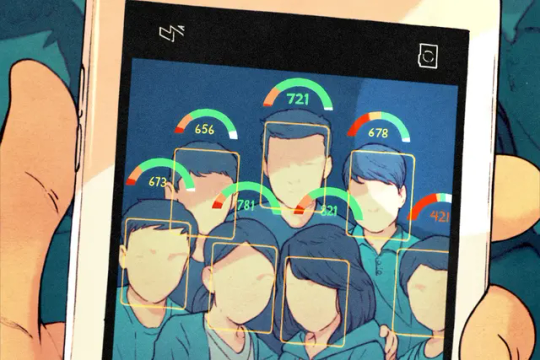
Die Gefahren für die Gesundheit
Diverse Gefahren tun sich mit der Implementierung solcher Systeme auf. Es sind Gefahren, welche sich heute und in der Zukunft ausprägen werden. Im Hinblick auf das schnelle Voranschreiten der Technologie, gehen Auswirkungen ebenso schnell miteinher und bleiben nicht in der Zeit zurück. Alles wird besser, schneller, digitaler und messbarer. Aber kommt der Menschliche Verstand dieser Entwicklung hinterher? Der Gewinn wird messbar, die Leistung wird messbar, der Sport wird messbar und nun auch das Verhalten?
Wenn der Mensch als solcher lediglich quantifizierbar und zugleich mit seinen Mitmenschen vergleichbar gemacht wird, geht die Persönlichkeit und die Einzigartigkeit verloren. Dem Individuum werden keine menschlichen, sondern technische und digitale Eigenschaften zugeschrieben. Das „Social Credit System“ kann dazu führen, dass die vom System betroffenen Personen sich selbst nicht mehr als Individuum wahrnehmen und dem Druck der ständigen Verbesserung unterliegen. Verbesserung in dem Sinne, dass der Score höher wird. So entspricht ein höherer Zahlenwert für einen besseren Score und geht mit finanziellen und gesellschaftlichen Benefits einher. Doch dieser Score (Wert) ist nur dann aussagekräftig, wenn es Vergleichswerte vorliegen. So ist ein einziger Score ohne Bewertung, lediglich ein Wert in einem definierten Wertebereich. Es ist aber nicht klar, was dieser Wert aussagt. Ist er als „gut“ oder „schlecht“ einzustufen? Erst mittels mehrerer gesammelten „Scores“, ist die vorab Einschätzung möglich. Je mehr Scores erhoben werden, desto mehr ergibt sich aus all den Zahlenwerten eine Art Verteilung. Beispielsweise ist die Zahl 800 im Vergleich zur 600 näher an der 1.000 und zunächst als „besser“ einzuordnen. Wenn aber erhobene Daten einen Durchschnittswert von 600 erfassen, so wird dem Wert 800 eine neu definierte Bewertung zugewiesen. Es wäre nicht mehr die bessere 800, sondern vielmehr die Zahl der Überflieger. Sie würde nicht dem normalen Wert entsprechen und eine Besonderheit darstellen. Aus diesem Beispiel geht hervor, dass nicht allein die Höhe des Scores entscheidend ist, es ist viel mehr die vergleichbare Menge, welche den Score interpretiert.
Die Interpretation ist zudem auf von Menschen festgelegten Daten festgelegt und betont zugleich ein Paradoxon. Der Mensch legt Kriterien fest, welche die Technik digital erfasst und interpretiert, nur um sich selbst in der Gesellschaft zu bewerten. Der Mensch agiert hier als Marionettenspieler. Er ist trägt die Verantwortung für das System und dessen Auswirkungen. Denn er selbst hat das System erfunden und implementiert. Die Auswirkungen, wie gesellschaftlicher Druck, soziale Ausgrenzung oder Selbstwertkomplexe ist nur eine Hand voll der möglichen gesundheitlichen Folgen. Im Endeffekt ist der Mensch, wie zuvor illustriert dafür selbst verantwortlich.
Gesellschaftlicher Druck, soziale Ausgrenzung oder Selbstwertkomplexe sind können sich chronifizieren und dauerhaft bleibende Schäden bei den Betroffenen hinterlassen. Jeder Mensch verfügt über unterschiedlich stark ausgeprägte Schutzfaktoren, die ihm dabei verhelfen, solche negativen Folgen abzuwehren und ihnen keinen Platz im eigenen Leben einzuräumen. Dazu zählen beispilesweise die Kontrollüberzeugung („Locus of Control“), die Widerstandsfähigkeit („Hardiness“), die Selbstwirksamkeitserwartung (oder auch Kompetenzerwartung), der Optimismus, sowie der Kohärenzsinn. Doch so unterschiedlich, wie wir Menschen sind, genauso unterschiedlich ist die Ausprägung der Schutzfaktoren. Das soziale Umfeld, Einkommen, Bildung, das Herkunftsland, die Kultur, die Wirtschaftslage etc., all das können individuelle Schutzfaktoren darstellen.
Eine der grundlegenden Auswirkungen liegt im bereits genannten gesellschaftlichen Druck, der durch die permanente Bewertung des individuellen Verhaltens entsteht. Diese ständige Überwachung kann zu einem erhöhten Stressniveau und Angstgefühlen führen, was wiederum negative Auswirkungen auf die psychische Gesundheit haben kann. Ein weiterer relevanter Aspekt betrifft den Zugang zu Gesundheitsdienstleistungen. Personen mit niedriger Bewertung im „Social Credit System“ könnten möglicherweise Schwierigkeiten haben, qualitativ hochwertige medizinische Versorgung zu erhalten. Dies könnte zu einer ungleichen Verteilung von Gesundheitsressourcen führen und die Gesundheitschancen bestimmter Bevölkerungsgruppen beeinträchtigen. Das System könnte auch Veränderungen im individuellen Lebensstil erzwingen, da Menschen bestrebt sein könnten, Verhaltensweisen anzupassen, die als positiv bewertet werden. Diese Anpassungen könnten sich ebenfalls auf die physische Gesundheit auswirken, beispielsweise durch Veränderungen in Ernährung- und Bewegungsgewohnheiten. Die permanente Überwachung könnte zudem zu Selbstzensur führen, da Menschen bestrebt sind, Verhaltensweisen zu vermeiden, die eine negative Bewertung nach sich ziehen könnten. Diese Selbstzensur und emotionale Unterdrückung könnten wiederum Auswirkungen auf die psychosoziale Gesundheit haben. Ein nicht zu vernachlässigender Punkt ist die potenzielle gesellschaftliche Ausgrenzung von Personen mit niedriger „Scores“. Diese Ausgrenzung führen zu Stigmatisierung und soziale Belastungen mit sich bringen.
Das „Social Credit System“ kann nicht nur gesellschaftliche, sondern auch erhebliche potenzielle Auswirkungen auf die Gesundheit haben kann. Diese Auswirkungen reichen von psychischem Stress über den Zugang zu Gesundheitsdienstleistungen bis hin zu Veränderungen im Lebensstil und möglicher gesellschaftlicher Ausgrenzung.
Was denken Befürworter*innen?
Diverse Kritik ist deutlich zu erkennen, aber dass es zur Einführung des „Social Credit Systems“ kam, spricht für das Vorhandensein positiver Aspekte. Denn obwohl das System in China auf geteilte Meinungen stößt, gibt es eine beträchtliche Anzahl von Bürger*innen, die es stark befürworten. Ein maßgeblicher Grund dafür liegt darin, dass es nicht nur als Instrument der Überwachung betrachtet wird, sondern als ein Mechanismus, der die Lebensqualität verbessern soll. Die gezielte Schließung von institutionellen Lücken wird ebenfalls als positiver Aspekt gesehen. Die Vision, eine vertrauenswürdige und gesetzgesteuerte Gesellschaft zu schaffen, indem Rechenschaftspflicht in verschiedenen Lebensbereichen eingeführt wird, gewinnt Unterstützung. Die Vorteile werden als äußerst attraktiv betrachtet. Die flächendeckende Rechenschaftspflicht soll Vertrauen und Ehrlichkeit in der Gesellschaft fördern, während Belohnungsanreize, wie die Möglichkeit, Bankkredite mit niedrigen Zinsen zu erhalten, viele Bürger*innen ansprechen. Darüber hinaus soll das System dazu beitragen, die Lebensmittelsicherheit zu gewährleisten und Probleme wie Umweltverstöße und Internetbetrug zu bekämpfen. Auch der sogenannte Abschreckungsmechanismus wird als ein weiterer positiver Aspekt hervorgehoben. Schlecht bewertete Bürger*innen sehen sich ernsthaften Folgen und Strafen gegenüber, was als effektive Präventivmaßnahme gegen kriminelle Aktivitäten angesehen wird. Schließlich strebt das Sozialkreditsystem an, den wahrgenommenen Mangel an Vertrauen in der Gesellschaft zu beseitigen. In einer kürzlich durchgeführten Online-Umfrage in der Volksrepublik China sprachen sich 59 % der 2.209 Befragten dafür aus, dass die Zentralregierung das „Social Credit System“ in China verwalten sollte, was darauf hindeutet, dass trotz kontroverser Diskussionen eine beträchtliche Zustimmung für dieses System besteht.
Ausblick für die Zukunft
In einer potenziellen Zukunft, in der das "Social Credit System" eine breite gesellschaftliche Rolle spielt, wären die Auswirkungen auf die Gesundheit vielfältig und komplex. Einerseits könnte das System als Werkzeug zur Förderung gesundheitsfördernder Verhaltensweisen dienen. Durch Belohnungen für sportliche Aktivitäten, gesunde Ernährung und Vorsorgeuntersuchungen könnten Bürger*innen zu einem bewussteren Lebensstil motiviert werden. Dies hätte möglicherweise positive Auswirkungen auf die Prävention von Krankheiten und die Förderung des allgemeinen Wohlbefindens.
Auf der anderen Seite besteht die Gefahr, dass die ständige Überwachung durch das "Social Credit System" zu einem Anstieg des Stresslevels führt. Die permanente Bewertung und Kategorisierung von individuellem Verhalten könnten Ängste hinsichtlich der eigenen sozialen Reputation verstärken. Ein solcher Stress könnte negative Folgen für die psychische Gesundheit haben und sogar zu einem Anstieg stressbedingter Erkrankungen führen.
Ein weiterer Aspekt, der berücksichtigt werden sollte, ist die potenzielle Stigmatisierung und Diskriminierung aufgrund von Gesundheitsbewertungen. Wenn Menschen aufgrund ihres Gesundheitsverhaltens benachteiligt werden, könnte dies zu gesellschaftlichen Spaltungen führen und die ohnehin schon bestehenden Ungleichheiten verstärken. Dies hätte langfristig nicht nur negative Auswirkungen auf die physische, sondern auch auf die psychosoziale Gesundheit der Betroffenen.
Es besteht jedoch die Möglichkeit, dass im Zuge des "Social Credit Systems" auch innovative Ansätze zur Förderung der Gesundheit entwickelt werden. Regierungen und Organisationen könnten Anreize schaffen, die über das traditionelle Belohnungssystem hinausgehen. Dazu könnten Technologien zur Gesundheitsüberwachung, verbesserter Zugang zu Gesundheitsdiensten und Anreize für gesundheitsfördernde Innovationen gehören.
Letztendlich wird der Ausblick stark von der Art und Weise abhängen, wie solche Systeme implementiert werden und wie die Gesellschaft darauf reagiert. Ein ausgewogener Ansatz, der individuelle Freiheiten respektiert und ethische Bedenken ernst nimmt, ist entscheidend, um positive Auswirkungen auf die Gesundheit zu gewährleisten.
Verwendete Quellen
Creemers, R. (2018): China's Social Credit System: an evolving practice of control. Available at SSRN 3175792.
Gapski, H.; Packard, S. (2021): Super-Scoring? Datengetriebene Sozialtechnologien als neue Bildungsherausforderung. Vol. 6. kopaed verlagsgmbh.
Geller, A. (2022): Social Scoring durch Staaten.
Hong, K. (2019): The complicated truth about China's social credit system.In: https://www.wired.co.uk/article/china-social-credit-system-explained: 6/6/22, 8:51 AM/ WIRED UK
In East Blog: Warum akzeptieren Chinas Bürger das Sozialkreditsystem? In: Institute of East Asian Studies, letzter Zugriff 17.12.2023.
Liu, C. (2019): Multiple Social Credit Systems in China. Economic Sociology: The European Electronic Newsletter 21 (1): 22–32.
Schabacher, G.; Spano, W. (2018) Das chinesische Social Credit System.- Totalitäre Kontrolle und das Ende der Freiheit oder der Weg zu einer ehrlichen Gesellschaft?
Schäfer, H. et al. (2000): Schutzfaktoren: Was hält uns gesund. Aktiv Gesundheit fördern, Stuttgart.
0 notes
Text
L'avenir ne tient qu'à un code.
Illustration réalisée avec Midjourney, Photoshop & Luminar

0 notes
